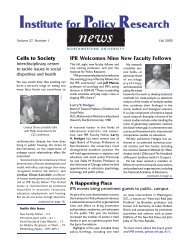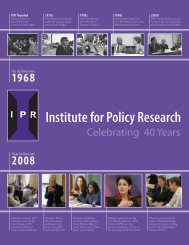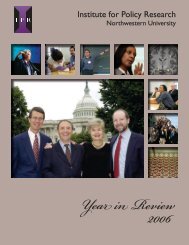Highlights of 2011 - Institute for Policy Research - Northwestern ...
Highlights of 2011 - Institute for Policy Research - Northwestern ...
Highlights of 2011 - Institute for Policy Research - Northwestern ...
You also want an ePaper? Increase the reach of your titles
YUMPU automatically turns print PDFs into web optimized ePapers that Google loves.
Poverty, Race, AND Inequality<br />
Economic Opportunities <strong>for</strong> Women<br />
About the Program<br />
Beaman is working in the West African nation <strong>of</strong> Mali to evaluate<br />
the Saving <strong>for</strong> Change Program, a new <strong>for</strong>m <strong>of</strong> community<br />
savings program that integrates self-managed saving and lending<br />
groups with education sessions. In the rural regions <strong>of</strong> Mali, the<br />
economy is mainly based on subsistence agriculture, and a lack<br />
<strong>of</strong> financial means to hire labor and buy input can put significant<br />
limits on women’s economic opportunities. Locally known as<br />
Épargner pour le Changement, the Saving <strong>for</strong> Change Program<br />
was implemented to increase women’s ability to save and<br />
create access to credit. It also helps them invest in agricultural,<br />
or other small business, activities. The program was <strong>of</strong>fered to<br />
a random sample <strong>of</strong> 250 villages in Mali’s Ségou region. Group<br />
members save a set amount each week and can benefit from<br />
short-term loans from the group savings fund. Training group<br />
members who volunteer to start new Saving <strong>for</strong> Change groups<br />
themselves accelerate the growth <strong>of</strong> the program. To test the<br />
effectiveness <strong>of</strong> different implementation strategies, Beaman<br />
and her colleagues are comparing the two methods <strong>for</strong> training<br />
village replicator agents—one in which replicators receive a<br />
pictorial manual and a <strong>for</strong>mal three-day training session on how<br />
to start and manage groups and another that does not give any<br />
<strong>for</strong>mal training, reducing program costs.<br />
Kinship and Financial Networks<br />
Many risks are present in rural developing economies, yet<br />
<strong>for</strong> many households in these economies, consumption and<br />
investment are insured against short-term risks to a large<br />
extent, despite limited availability <strong>of</strong> <strong>for</strong>mal banking and<br />
insurance products. While the importance <strong>of</strong> kinship networks<br />
and financial access are each increasingly well documented, the<br />
channels through which these effects occur and the relationship<br />
between kinship networks and financial access are not well<br />
understood. Using unique data from rural Thai households,<br />
economist and IPR associate Cynthia Kinnan and co-author<br />
Robert Townsend <strong>of</strong> MIT examine this interplay. Their results<br />
indicate that access to the <strong>for</strong>mal financial system plays<br />
an important role in smoothing consumption in the face <strong>of</strong><br />
income shocks. Strikingly, an indirect connection is as effective<br />
as a direct connection, suggesting that borrowing and lending<br />
among households act to distribute capital from <strong>for</strong>mal financial<br />
institutions. This implies that not every household in a village<br />
needs to use the banking system directly to benefit. The article<br />
was published in the American Economic Review.<br />
Anti-Poverty <strong>Policy</strong> and Transfers<br />
A central question in anti-poverty policy is whether welfare<br />
transfer programs should be made in kind or as cash, with the<br />
<strong>of</strong>t-cited rationale <strong>for</strong> in-kind transfers being to encourage<br />
consumption <strong>of</strong> certain goods. While both types <strong>of</strong> transfers<br />
James Rosenbaum, Chair<br />
In the program on Poverty, Race, and Inequality,<br />
IPR researchers look at various causes <strong>of</strong> poverty,<br />
racism, and inequality and their consequences,<br />
including continuation <strong>of</strong> an influential research<br />
line on the effects <strong>of</strong> public housing and<br />
residential policies on child and adult outcomes.<br />
The researchers’examinations <strong>of</strong>ten overlap with<br />
other IPR research programs, in particular Urban<br />
<strong>Policy</strong> and Community Development and Child,<br />
Adolescent, and Family Studies.<br />
increase the demand <strong>for</strong> normal goods, only in-kind transfers<br />
also increase supply. Hence, in-kind transfers should lead<br />
to lower prices than cash transfers, which help consumers at<br />
the expense <strong>of</strong> local producers. A recent working paper coauthored<br />
by economist and IPR associate Seema Jayachandran<br />
tests this hypothesis using a large food assistance program <strong>for</strong><br />
poor households in Mexico, which randomly assigned villages<br />
to either receive boxes <strong>of</strong> food trucked into the village, equivalently<br />
valued cash transfers, or no transfers. The study shows<br />
sizeable price effects. The decline in food prices caused by inkind<br />
transfers relative to cash transfers represents an indirect<br />
benefit <strong>of</strong> in-kind transfers <strong>for</strong> consumers that is large relative<br />
to the direct transfer itself. The researchers also find that agricultural<br />
pr<strong>of</strong>its increase in cash villages, where food prices rose,<br />
more so than in in-kind villages, where prices fell. These price<br />
effects were particularly pronounced <strong>for</strong> very geographically<br />
isolated villages, where the most impoverished people live.<br />
Positive Interracial Interactions<br />
Although the blatant racism <strong>of</strong> earlier eras has declined<br />
dramatically in recent decades, contemporary <strong>for</strong>ms <strong>of</strong> bias<br />
continue to thwart the realization <strong>of</strong> genuine racial equality. In a<br />
study published in the Journal <strong>of</strong> Personality and Social Psychology,<br />
a team <strong>of</strong> researchers including IPR social psychologist Jennifer<br />
Richeson investigated the hypothesis that perspective taking,<br />
actively contemplating others’ psychological experiences, can<br />
17

















